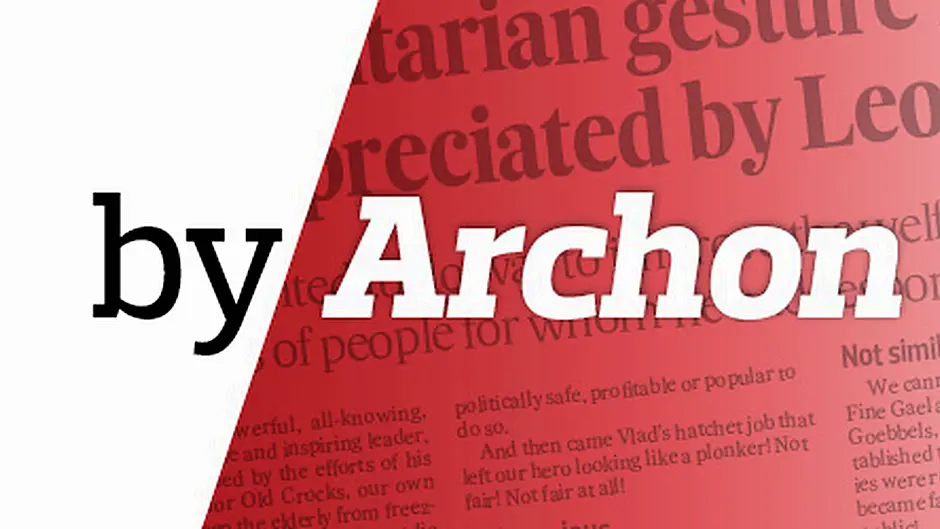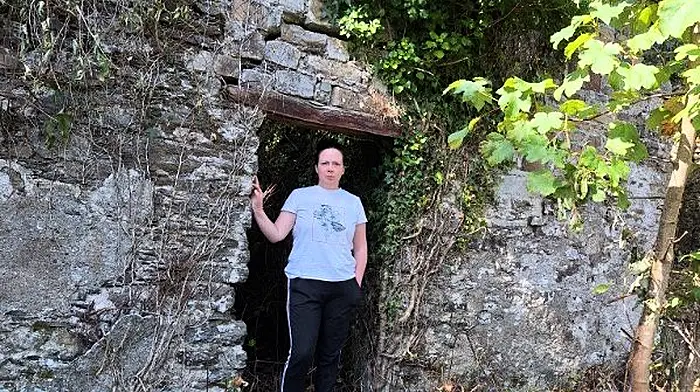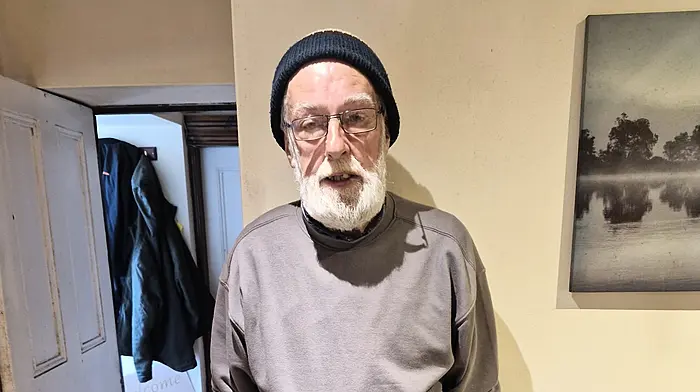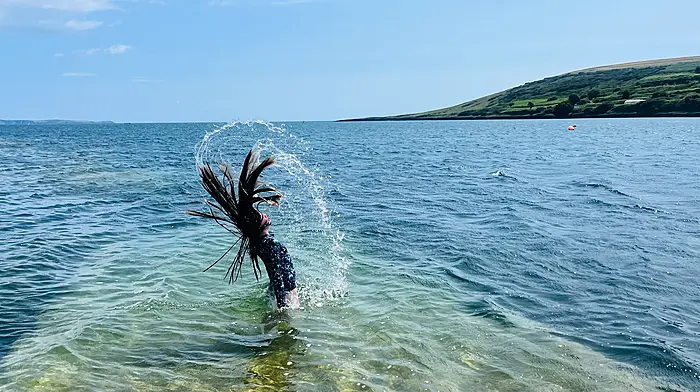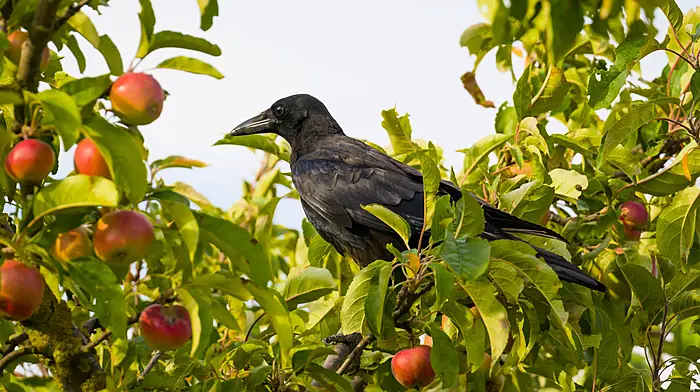CAN we describe the Government’s support for a State commemoration of the Gentle Black and Tans, RIC and Auxiliaries as an utter balls-up? And no, we’re not referring to the old days when a shipboard disaster, such as a mutiny or a request for assistance, was communicated to the outside world by hoisting two brightly coloured balls up the rigging.
Certainly not! Our tasteless remark refers to the formal honours Taoiseach Vlad and Justice Minister Charlie Flanagan have in mind for those members of the Royal Irish Constabulary (RIC) who tried to maintain public order between 1919 and 1921; particularly those guardians of the peace who were ‘murdered’ for doing ‘only what police officers do’ – protecting communities from harm!
By implication, and whether intended or not, posthumous distinction for the RIC also would have to include their comrades-in-arms: Black and Tans, Auxiliaries and British Army.
About which we have to say that the commemoration idea was so unhinged that one cannot but surmise that it was hatched in a pub after hours, accompanied by the sound of hysterical laughter and the certainty that anyone who would take the idea seriously deserved immediate committal to a lunatic asylum.
But taken seriously it was, and (we presume) to the horror of the mischievous architects of the practical joke, Fine Gael was so impressed that the party considered the idea to be deserving of political attention at the highest level.
Horror show
Since then, we’ve had the Charlie Flanagan Horror Show with the public subjected to unrestrained craw-thumping about ‘respecting all traditions on our island and being mature enough to acknowledge all aspects of our past.’
Even more hair-raising is the association in the public mind of Vlad, Flanagan and the entire Fine Gael organisation with the Royal Irish Constabulary and its fellow gangsters (Black and Tans, Auxiliaries and British Army).
And, in the public mind also but on the opposing side is the Ken Loach’s film, The Wind that Shakes the Barley, the Kilmichael Ambush, Crossbarry, Tom Barry, burnings, torture, random killings and an array of British atrocities that were used to terrorise the population in West Cork and elsewhere (one little-known example is the killing of Eileen Quinn of South Galway, a 24 year-old woman, seven months pregnant who was waiting for her husband to return from Gort fair).
As Mary Lou McDonald accurately stated: ‘In no other State would those who facilitated the suppression of national freedom be commemorated by the State.’ And that’s the point at issue!
Or to put matters another way: have we now become so anti-national that it’s easy for a party, such as Fine Gael, to downplay those aspects of our revolutionary past that do not fit into a ‘revised’ interpretation of historical events and ideas?
Bad eggs
For instance, Flanagan bleated ‘aren‘t we all Irishmen and didn’t we do a great job commemorating Irishmen who fought in World War One, and now is our chance for (commemorating) the status of the Royal Irish Constabulary.’
However, despite his unconcealed admiration of the RIC, he acknowledges that the Constabulary also contained bad eggs. But, he argues, there were thousands of decent RIC men who behaved with dignity and honour in serving their communities and ‘we should not seek to airbrush these people from our history.’
Strangely, the effect of Flanagan’s nattering about making the Republican viewpoint compatible with British political thinking had a curious effect. It created the impression that some very ancient IRA men were still hiding out in the Boggarah mountains, like those Japanese soldiers who refused to surrender after World War II, and if only they learned about the Minister’s marvellous ‘reconciliation’ policy, they would warmly embrace the joys of peacetime Inniscarra!
To give the Fianna Fáil leader, Our Mickey, his due, he did not mention ‘reconciliation’ at all. Instead he called for a calm discussion, which did not deter him from accusing the Government of causing ‘unnecessary controversy.’
Mickey advocated an ‘all-inclusive event’ that ‘remembered’ those who died during the ‘Troubles’. Said the former máistir: ‘It is important to explore every element of this period and use this time as an opportunity to properly discuss every aspect of a complex history.’
True blue Irishmen
He seemingly took the point of view that, in remembering our history, we are not obliged to condone what happened. Varadkar, for his part, was ‘disappointed’ at the decision of some ‘headline-seeking mayors’ to boycott the official commemoration of the RIC.
All of which did not prevent rumours from circulating about the inevitable political beheading of Justice Minister Flanagan for having landed his boss in the doo-daa.
Nevertheless, he has a powerful ally in former ‘Culture’ Minister, Heather Humphries! She’s all for officially honouring the Peelers, reminding us that such gents, as true-blue Irishmen, made ‘the ultimate sacrifice. They gave up their lives’ (for King and Country, we suppose).
At the same time, Ms Humphries regretted Fianna Fáil’s readiness to ‘slip’ the controversy into ‘a political area’ – which, she warned, was a dangerous place to go.
And then there was the comment from former TD and Senator, Maurice Manning concerning the ‘expert’ Advisory Group on Centenary Commemorations. He ruefully observed that the Advisory Group had recommended a simple ceremony in Dublin Castle, but mysteriously ‘somebody lost the run of themselves and called it a State event.’ Was this a ‘dig’ aimed at Flanagan?
Manning wants the special cross-party committee on commemorations to be reconvened in order to look again at the question of how we appropriately appraise the activities of the RIC and the DMP. Nothing wrong with that!
Fools and turncoats?
Mickey Martin is rather good at commemorations. Some years ago he officiated at the unveiling of a monument in Carrigaline to the English sea captain, Francis Drake, the infamous adventurer, slave trader and mass murderer.
The local Lions Club erected the statue to commemorate the pirate who sailed up the River Owenabue while fleeing from pursuing Spanish ships. Mickey was asked to do the honours; which he did, accompanied by a large naval guard of honour from Haulbowline.
However, some days later, the dedication plaque to the monster who had participated in the mass-murder of the entire population of Rathlin Island, was defaced. Sprayed onto the statue was a simple message in Irish: ‘We’re not all fools or turncoats!’
Question is: will the same sentiment be expressed with regard to Vlad’s and Flanagan’s ‘reconciliation’ policy for the State’s honouring of the Royal Irish Constabulary?

